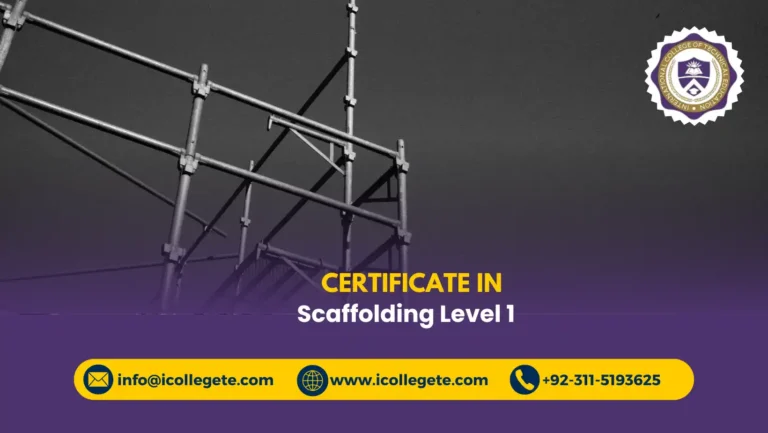In today’s competitive business environment, organizations across industries are placing increasing emphasis on maintaining high standards of quality in every aspect of their operations. The Total Quality Management (TQM) Course in Gujrat offers professionals the tools and strategies to implement quality management practices that enhance efficiency, reduce waste, and improve customer satisfaction. This comprehensive training program equips students with the knowledge and skills to become key contributors to an organization’s success through effective quality management practices.
Total Quality Management (TQM) is an approach that involves all members of an organization in improving processes, products, services, and the culture in which they work. The TQM Course in Gujrat is designed to provide participants with a thorough understanding of TQM principles and techniques. The course covers the concepts of customer satisfaction, continuous improvement, and the systematic approach to quality in all business processes. Students will learn how to apply these principles across various departments and processes within an organization to ensure maximum efficiency and productivity.
The Total Quality Management course in Gujrat focuses on the core principles of TQM, including leadership, customer focus, employee involvement, process management, and continuous improvement. The program incorporates both theoretical knowledge and practical skills to help students understand how to develop, implement, and maintain quality management systems that align with the objectives of an organization.
This course typically lasts between 3 to 6 months and is delivered through a combination of lectures, case studies, practical exercises, and group discussions. Students will also gain hands-on experience in designing quality systems, solving quality-related issues, and creating performance improvement strategies within a business context.
Study Units
The Total Quality Management course includes the following core study units:
- Introduction to Total Quality Management: Understanding the foundations, history, and evolution of TQM
- Principles of TQM: Customer focus, leadership, employee involvement, process management, and continuous improvement
- Quality Standards and Models: ISO 9001, Six Sigma, and other globally recognized quality frameworks
- TQM Tools and Techniques: Use of tools like Pareto analysis, fishbone diagrams, control charts, and flowcharts
- Leadership and Management in TQM: The role of leadership in driving quality culture
- Process Improvement and Innovation: Techniques for identifying and improving business processes
- Data-Driven Decision Making: Statistical process control (SPC) and other data analysis techniques to monitor and improve quality
- Quality Audits and Assessments: How to conduct quality audits and manage assessments to ensure continuous improvement
- Change Management: Managing change and overcoming resistance in the implementation of TQM initiatives
- Case Studies and Practical Applications: Real-world examples of TQM implementation in various industries
Learning Outcomes
By the end of the Total Quality Management course, participants will be able to:
- Understand the key principles and components of Total Quality Management
- Apply TQM tools and techniques to real-world scenarios to improve business processes and performance
- Implement and maintain quality management systems in accordance with industry standards
- Develop and lead initiatives that promote continuous improvement and customer satisfaction
- Analyze and solve quality-related issues using data-driven decision-making methods
- Perform quality audits and assessments to evaluate the effectiveness of quality systems
- Lead teams in driving organizational change towards a culture of quality
- Understand the impact of leadership and employee involvement in achieving quality objectives
Course Benefits
- Comprehensive Learning: Gain a deep understanding of TQM principles, tools, and techniques that can be applied to various industries
- Practical Skills: Develop hands-on skills in process management, continuous improvement, and quality audits
- Improved Career Opportunities: TQM knowledge is highly valued by employers in manufacturing, service industries, and other sectors, opening doors to a variety of roles
- Enhanced Problem-Solving Abilities: Learn to identify, analyze, and solve quality-related issues in a systematic manner
- Leadership Development: Gain the skills needed to lead quality initiatives and drive a culture of continuous improvement in organizations
- Certification: Upon completion, students will receive a certification that demonstrates their expertise in Total Quality Management, which can enhance their professional profile
- Industry Recognition: Understanding global quality standards such as ISO and Six Sigma will improve your credibility in the field
Who Is This Course For?
The Total Quality Management course is ideal for:
- Managers and Supervisors: Professionals in management roles who want to enhance their knowledge of quality management and improve organizational processes
- Quality Control and Assurance Professionals: Individuals working in quality control who seek to deepen their understanding of TQM practices and principles
- Business Consultants: Consultants who work with organizations to improve business processes and implement quality management systems
- Team Leaders and Department Heads: Those responsible for leading teams or departments who want to enhance performance through quality-focused leadership
- Fresh Graduates: Individuals who have recently graduated and want to pursue a career in quality management or continuous improvement
- Anyone Interested in Process Improvement: Professionals in various industries who wish to learn how to drive organizational change and implement quality management systems
Future Progression
Graduates of the Total Quality Management course can pursue a wide range of career opportunities and progression paths:
- Quality Management Roles: Work as a TQM Specialist, Quality Control Manager, or Quality Assurance Manager in manufacturing, service industries, or consulting firms
- Leadership and Management Positions: Advance to positions such as Operations Manager, Process Improvement Manager, or General Manager with a focus on continuous improvement and quality systems
- Certification and Specialization: Obtain additional certifications in Six Sigma, Lean Management, or ISO 9001 to further enhance career prospects
- Consultancy: Start your own consultancy firm offering TQM implementation services to businesses looking to improve their quality management systems
- Higher Education: Pursue further studies in business management, operations management, or industrial engineering to specialize further in quality management
- Entrepreneurship: Use your TQM expertise to improve the processes of your own business or become a business consultant helping companies improve their overall efficiency and quality
The Total Quality Management Course in Gujrat is a highly valuable program for professionals seeking to improve their understanding of quality management principles and apply them in real-world situations. As organizations continue to prioritize quality and customer satisfaction, the skills gained from this course will position you as an expert in TQM, making you a sought-after professional in industries such as manufacturing, healthcare, service, and more. Whether you’re looking to advance in your current role or pivot into a new area of expertise, this course will help you develop the knowledge and tools necessary for a successful career in quality management.





